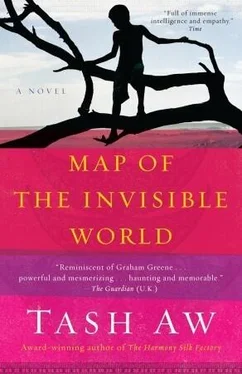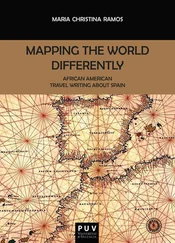Tash Aw - Map of the Invisible World
Здесь есть возможность читать онлайн «Tash Aw - Map of the Invisible World» — ознакомительный отрывок электронной книги совершенно бесплатно, а после прочтения отрывка купить полную версию. В некоторых случаях можно слушать аудио, скачать через торрент в формате fb2 и присутствует краткое содержание. Год выпуска: 2010, Издательство: Spiegel & Grau, Жанр: Современная проза, на английском языке. Описание произведения, (предисловие) а так же отзывы посетителей доступны на портале библиотеки ЛибКат.
- Название:Map of the Invisible World
- Автор:
- Издательство:Spiegel & Grau
- Жанр:
- Год:2010
- ISBN:нет данных
- Рейтинг книги:4 / 5. Голосов: 1
-
Избранное:Добавить в избранное
- Отзывы:
-
Ваша оценка:
- 80
- 1
- 2
- 3
- 4
- 5
Map of the Invisible World: краткое содержание, описание и аннотация
Предлагаем к чтению аннотацию, описание, краткое содержание или предисловие (зависит от того, что написал сам автор книги «Map of the Invisible World»). Если вы не нашли необходимую информацию о книге — напишите в комментариях, мы постараемся отыскать её.
comes an enthralling novel that evokes an exotic yet turbulent place and time—1960s Indonesia during President Sukarno’s drive to purge the country of its colonial past. A page-turning story,
follows the journeys of two brothers and an American woman who are indelibly marked by the past — and swept up in the tides of history.
Map of the Invisible World — читать онлайн ознакомительный отрывок
Ниже представлен текст книги, разбитый по страницам. Система сохранения места последней прочитанной страницы, позволяет с удобством читать онлайн бесплатно книгу «Map of the Invisible World», без необходимости каждый раз заново искать на чём Вы остановились. Поставьте закладку, и сможете в любой момент перейти на страницу, на которой закончили чтение.
Интервал:
Закладка:
“Um, Adam,” she said, reaching out and touching his shoulder, “I’ve got to go out soon.”
When he opened his eyes he stared at her as if he had been waiting for her to wake him, but his eyes were still curiously blank, as if the world had not yet filled his consciousness.
He blinked. “I’ll come with you.”
“No, you can’t.”
“Why not?” He rose and ran his fingers briskly through his hair to smooth it down. He looked around for his T-shirt before reaching for the pile of clothes, all the time holding the thin sheet to his chest.
It made her strangely happy to see him rested; a pleasant smile had settled on his face, making him look younger than he was; it was as though he felt safe in her house, she thought, as though he trusted her. “I’m sorry, you can’t come with me because I’m going to the U.S. Embassy to try and get some information on your father. They’re quite touchy at the moment about random Indonesians breezing through their gates. And this T-shirt is going to be washed.” She held it hanging from one finger like a rag. “I won’t be long. There should be some food in the kitchen — help yourself to anything. Just promise me you won’t leave the house.”
A CROWD OF PROTESTORS had gathered outside the embassy, about two hundred students spread out on the edge of the square, spilling into the road. They squatted beside sagging banners — CRUSH MALAYSIA, DOWN WITH WESTERN IMPERIALISTS — smoking cigarettes and chatting placidly. They wore pieces of cloth tied in bands around their heads and some of the boys were bare-chested. A few of them began to chant something, standing up and waving long, thin sticks, attempting to rouse the others; but it was too hot and they were too tired, and the incipient revolt quickly died down.
“Very tedious, this anti-Malaysian nonsense,” Margaret said as they drove through the gates. “Surely they can’t keep it up much longer.”
“You underestimate Sukarno,” Mick said. He had developed a new way of speaking that Margaret had only recently noticed, his lips pressed tightly together, never opening very much, as if he was gripping a cigarette between them. He had quit smoking a year ago, he said, but it was as if his lips still retained their shape. “This Konfrontasi thing’s become an obsession, something absolutely essential to his existence. The choice of the word is telling, I think: He wants to confront the whole world, particularly Malaysia. He really hates all that it represents — I think he actually dislikes the idea of a small neighboring country slipping relatively painlessly into independence and becoming rich while his own country is in a mess.”
“So you don’t think it’s all part of his game, then? I thought it was just silliness, you know, this Asian loss of face. He’s pissed off that the Malaysians don’t want to join him in whatever he’s doing, and now he’s just using them to further his — well, whatever he does.”
“Oh, everything’s a game with him, but it’s beginning to feel a bit out of control. Things are accelerating, and I’m not sure he’s got a firm grip on all the bits that are whizzing around him. This Malaysia thing is pushing him further and further toward communism, and that pisses the Americans off even more. What began as just a flirtation with the Soviets and the PKI quickly became a hand job in the backseat of the car, and now it’s threatening to become a full-blown marriage, which I’m not sure he wants.”
“I hope your award-winning reports aren’t quite so imaginatively illustrated.”
“You know what I mean.” He smiled. “It’s as if Sukarno’s been driving a big fat fast car, but now it’s careering out of control.”
Bill Schneider was waiting for them in his office. There was a photo of two children on his desk, a boy and a girl of about eight and six respectively, the boy wearing a baseball glove. Behind them was a lawn and a short section of white garden hose snaking its way toward the girl’s shoe; there was a suggestion of a clapboard house in the background.
“My kids,” he said, noticing Margaret looking at the photo. “They’re back in the States. Great, aren’t they?”
“Yes, they look very healthy. How’s your wife?”
“My ex-wife is fine. We communicate infrequently, mainly through our lawyers.”
“Shame. I think I remember her at Cornell — nice girl. From Vermont, isn’t she?”
Bill nodded. “Good memory. That was a long time ago … I’m glad you decided to come, Margaret. It’s nice to have you back.”
“Back where?”
He shrugged and reached for the photo of his children, adjusting it minutely as if it were a valuable painting in a museum. “Back in the fold.”
“Listen, I haven’t come here because I’ve suddenly decided that you’re my best friend. You know precisely why I came. A friend of ours has gone missing, and I need your help in finding him.”
“I see,” he said, smiling. He picked up an ashtray and moved it to another part of the desk, regarding it with the air of someone who had just rearranged the furniture in their living room. “A friend.”
“Bill, we’ve had our differences over the years, but we’ve always worked something out. I’m not the easiest of people — I’m the first to admit that — and I know I often say things that maybe I shouldn’t, but I know that you’re essentially a good guy trying to do good things.”
“Am I?”
“Yes, I believe so. Despite that repugnant facade.”
Bill Schneider smiled and shifted his ashtray again, testing it in a new position. “This friend of yours, he isn’t American, is he?”
“No, Dutch. Dutch-Indonesian, to be precise. I think you already know that.”
“That’s a problem, Margaret, because I can only look after the inter ests of U.S. citizens. Anyone else is beyond our jurisdiction. Our policy is not to get mixed up with everyone else’s affairs.”
Margaret let out a half snort, half laugh. “Please don’t speak to me as if I’m an idiot. Your job is based entirely on getting mixed up in other people’s affairs.”
Mick reached over and touched her arm lightly. “Calm down,” he said softly.
“Drink, anyone?” Bill got up and went to a cupboard. He opened it with a key to reveal a small icebox.
“Great, I’ll have a beer, thanks,” Mick said breezily.
“Hemlock, please,” Margaret said.
Bill set three bottles of Budweiser on the desk, placing them neatly on rattan coasters. “Would you like to hear a story?” he said.
Margaret rolled her eyes. “Not really, but you’re going to tell us anyway.”
“Just indulge me.” He smiled and took a sip of his beer. The air conditioner began to rattle, a rhythmic click-click-clack that grew louder every few seconds and then faded away to a hum before becoming louder again. The ceiling fan was on too, its blades edged with dirt, spinning lazily, barely stirring the air. “Some years ago a U.S. scientist came upon an ancient burial site on one of the islands on the fringes of the Moluccas. I can’t remember which island it was, but it doesn’t really matter. It was just one of the twenty thousand that make up the modern Republic of Indonesia: Its real name is irrelevant for the purposes of this story. Let’s call it Nusa Laut, Sea Island, Island of the Sea, whatever—”
“Imaginative.”
“Just let me get to the end. On this island — Nusa Laut — the indigenous population was made up largely of animists. There were also Christians and Muslims who moved there over the last few centuries, though neither group practiced their religion in the pure sense — theirs was a religion mixed with a hefty dose of local beliefs: spirits in the jungle, in the rocks and the streams and the sea, things that affect the everyday lives of the people who live on Nusa Laut — shall we call them the Lautese? Or the Lautians? Yes, that sounds better, doesn’t it? This curious mixture of peoples managed to find a happy way to live, and over the centuries, constructed ancient worship sites — temples and grottoes and shrines — and burial grounds that got swallowed up by the jungle. The locals were aware of these places, but they never thought twice about them — they were just there, part of the landscape. Then one day a geologist, an academic, comes along. Professional etiquette forbids him from taking anything from the island but he sees a fragment of a stone carving, a piece of a deity’s face — a nose, part of some lips, cheekbones — enough to convey a sense of complete peace in him. He looks around and slips it into his back pack. His local guide says nothing because it doesn’t matter to him — hey, it’s just a piece of stone, right? — and besides, he’s afraid of the white guy. The geologist takes it back to the States. He loves this rock. He doesn’t take it into the lab, he just keeps it in his study, locked away in a drawer. He takes it out and admires it from time to time. It’s beautiful, just so goddamn beautiful. That’s all it is to him: a thing of beauty. In fact, it’s the only good thing in his life. His career is going downhill, his wife left him some years back and he’s hit the bottle. One day he has a heart attack. The paramedics find him with an empty bottle of Jack Daniel’s in one hand and this piece of stone in the other. They look at it and figure, it’s old, it looks, well, archaeological, and this guy was a scientist, right? So they decide to return it to the university. It then passes through one hand to another until it ends up in an exhibition on tribal artifacts on campus. Nothing fancy, just a display of things collected over the years by the anthropology department. Africa, South America, Southeast Asia — it’s all the same to them. People come and they look without seeing, if you get what I mean — it’s all just old stuff . But one of the people who turns up is an Indonesian, okay, some kid from Jakarta on a Ford Foundation scholarship. He wanders in because he’s got nothing to do between classes and it’s cold outside, and he looks at the piece of stone and thinks, hey, that’s Lautian. Unmistakable. Where did they get that from? It’s a rare Indonesian artifact that was looted and needs to be returned to its home country. He makes a complaint to the school, they raise it with a senator they know, he raises it with the State Department. The Indonesian guy speaks to his buddies back here about it and the next thing you know, we’ve got the Soviets making speeches to us about stealing the ancient heritage of the Lautians. And on this little island itself, there are riots because of it, they’re rounding up every Westerner they can find and shooting them for being Imperialists who take advantage of Indonesia. Of course there are many Lautians who say, ‘This is crazy, stop this nonsense, this is none of our business, we’re being jerked around.’ Guess what happens to them? They get shot by the PKI. Sukarno sends in troops to quell the Communists, but no one’s sure how hard he’s trying, because he wants to be friends with the Communists too, and suddenly there’s all this shit around us. Twenty years ago a stone was a thing of beauty, now it’s a political tool. So ends the tragic story of Nusa Laut.”
Читать дальшеИнтервал:
Закладка:
Похожие книги на «Map of the Invisible World»
Представляем Вашему вниманию похожие книги на «Map of the Invisible World» списком для выбора. Мы отобрали схожую по названию и смыслу литературу в надежде предоставить читателям больше вариантов отыскать новые, интересные, ещё непрочитанные произведения.
Обсуждение, отзывы о книге «Map of the Invisible World» и просто собственные мнения читателей. Оставьте ваши комментарии, напишите, что Вы думаете о произведении, его смысле или главных героях. Укажите что конкретно понравилось, а что нет, и почему Вы так считаете.












